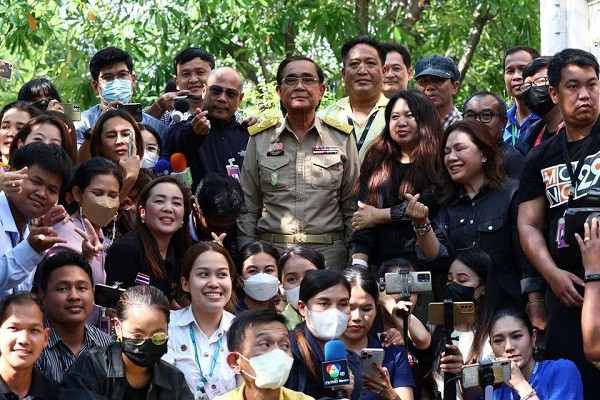Popular Reads
Top Results
Can't find what you're looking for?
View all search resultsPopular Reads
Top Results
Can't find what you're looking for?
View all search resultsThailand: A country of military coups, but stable and prosperous
It is not impossible that the the Thai military will reject a victory for incumbent Prime Minister Gen. (ret) Prayuth Chan-ocha in May because he has ruled the country for nine years now.
Change text size
Gift Premium Articles
to Anyone
G
iven that the Thai military has launched 22 coups, 13 of them successful, and initiated 20 constitutional amendments since the country’s establishment in 1932, the institution may look to another power seizure by force if its leaders are not happy with the outcome of the May 14 election, although two generals have ruled out such a possibility.
Thai armed forces chief Gen. Chalermpol Srisawat and army chief Gen. Narongpan Jitkaewtae have said the military will accept the results of the upcoming election, whatever they may be.
“The armed forces follow orders from the government that was formed through political means but we do not get involved in politics,” Chalermpol said in October 2022.
Many things could have happened in the last six months, however. Just in case the promise is broken, they should not repeat the humiliating experience of Gen. Sunthorn Kongsompong after toppling PM Chatichai Choonhavan’s government on Feb. 23, 1991. The general’s first wife suddenly ran amok upon seeing Sunthorn dancing with his mistress to celebrate his rise to power. Sunthorn’s wife dispersed the party, and his government only lasted one year.
It is not impossible that the the Thai military will reject a victory for incumbent Prime Minister Gen. (ret) Prayuth Chan-ocha in May because he has ruled the country for nine years now and will extend his term to four more years if reelected. He came to power after toppling then-prime minister Yingluck Shinawatra on May 22, 2014.
Indonesians who endured the 32-year regime of president Soeharto can easily sense Prayuth’s ends-justify-the-means strategy, akin to ex-general Soeharto’s, including the tricks he deployed to win six general elections in a row in 1971, 1977, 1982, 1987, 1992 and 1997.
It is also clear that the military would dislike the return of the political dynasty of ex-PM Thaksin Shinawatra, who has haunted the military establishment and pro-royal elites since 2001. Thaksin’s party is widely tipped to win the May election, although it may not be permitted to rule the country because of constitutional limitations.
The upcoming Thai election is expected to be a two-horse race between Prayuth and Thaksin’s daughter, Paetongtarn Shinawatra.
The Thai people have the constitutional right to choose their own future based on their experiences, including to accept a military coup after the election if they so choose. But they need to remember the era of military political intervention has passed. Fewer and fewer countries allow military coups to happen.
An exception is Thailand’s next-door neighbor: Myanmar. For the Myanmar military junta, the Thai military is a role model. In launching the coup in February 2021, Myanmar’s junta leader Gen. Min Aung Hlaing was inspired by the success of Prayuth in toppling a civilian government and manipulating domestic politics such that the 69-year-old ex-general could cling to power for nine years and counting.
Because of the election, Prayuth will be unlikely to attend the ASEAN Summit in Labuan Bajo, East Nusa Tenggara, from May 9 to 11, his second absence from a meeting of the regional bloc in Indonesia. Prayuth declined to attend the ASEAN emergency summit in Jakarta in April 2021 to address the Myanmar crisis, citing the COVID-19 pandemic.
Prayuth has openly said the coup in Myanmar is an internal affair and that ASEAN has no right to intervene. As a coup leader himself, Prayuth’s motivations for the position are clear.
After toppling the democratically elected prime minister Yingluck in May 2014, Prayuth declared himself the prime minister three years later. He won a widely-protested general election in 2019.
Ahead of the May election, Prayuth is trailing behind Paetongtarn in opinion polls. Paetongtarn is confident her party, Pheu Thai, will score a landslide win and that she’ll become prime minister. But such a scenario is next to impossible, as the 250-member Senate belongs fully to the military.
To take over the premiership, she has to win an absolute majority in the 500-member House of Representatives, which Prayuth will seek to prevent at all costs.
All parties associated with Thaksin have won seats in every election since 2001. According to Thai media, the Thaksin political dynasty is the number one enemy of the military and royalists. The dynasty, however, is very popular in the rural areas in the north and northeast of the country.
Thai people are very familiar with coups, and the economy has to own its path unrelated to the political situation. As reported by several international institutions, the country’s revenue from tourism accounted for 11 percent of gross domestic product, or US$59.8 billion, before COVID-19 struck in 2019. Foreign tourist arrivals exceeded 40 million that year, the fifth highest in the world.
Another pillar of the Thai economy is agriculture. The sector accounts for 6 percent of the GDP, employing about 30 percent of the country’s labor force. Thailand is a mecca of agriculture for ASEAN member states and is known as the world's most important exporter of tapioca products, rubber, frozen shrimp, canned tuna and canned pineapple.
According to the World Bank, Thailand’s economic growth is projected to have recovered to its pre-pandemic level of 3.4 percent in 2022, but growth will be lower than expected in 2023, at 3.6 percent, owing to global headwinds. Tourism and private consumption will remain the major drivers of growth.
International Monetary Fund data from 2022 shows that Thailand’s GDP per capita (purchasing power parity) stood at US$21,114, the fourth-highest in ASEAN, after Singapore, Brunei and Malaysia.
Perhaps due to Thailand’s robust economic growth at that time, Prayuth proposed during the ASEAN Summit he hosted in 2019 that the regional grouping jointly bid to host the 2034 World Cup. The global ambition was included in the leaders’ declaration, but now after the devastating pandemic, everybody has likely forgotten about it.
Thailand has always played a key role in the development of ASEAN. For outsiders like Indonesians, the repeated coups and constitutional amendments look strange. The Thai people have chosen their path, so let them decide their own future.
***
The writer is a senior editor at The Jakarta Post.











